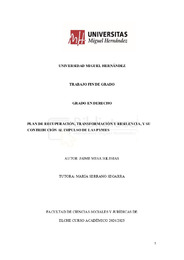Please use this identifier to cite or link to this item:
https://hdl.handle.net/11000/36993Full metadata record
| DC Field | Value | Language |
|---|---|---|
| dc.contributor.advisor | Serrano Segarra, María | - |
| dc.contributor.author | Mesa Iglesias, Jaime | - |
| dc.contributor.other | Departamentos de la UMH::Ciencia Jurídica | es_ES |
| dc.date.accessioned | 2025-07-28T11:47:16Z | - |
| dc.date.available | 2025-07-28T11:47:16Z | - |
| dc.date.created | 2025 | - |
| dc.identifier.uri | https://hdl.handle.net/11000/36993 | - |
| dc.description.abstract | En el presente Trabajo de Fin de Grado, llevaremos a cabo un estudio exhaustivo sobre el plan que realizo España para contrarrestar la crisis generada por el COVID-19 y como se aplicaron los fondos obtenidos gracias a la ayuda de la Unión Europea con la cual ayudará a España a revertir dicha situación generada por la pandemia. Otro punto que trataremos en este trabajo serán los distintos instrumentos mediante los cuales la Unión Europea apoya y ayuda al crecimiento de diversos sectores, así como el gran impacto que tiene el componente 13 para el desarrollo de la transición ecológica y la transformación digital que España va a llevar a cabo en los próximos años. Por último, haremos una breve explicación del principio “do not significant harm” e indicaremos las posibles soluciones y mejoras. | es_ES |
| dc.description.abstract | In this Final Degree Project, we will carry out an exhaustive study on the plan that Spain carried out to counteract the crisis generated by COVID-19 and how the funds obtained thanks to the help of the European Union were applied with which it will help Spain to reverse said situation generated by the pandemic. Another point that we will discuss in this work will be the different instruments through which the European Union supports and helps the growth of various sectors, as well as the great impact that component 13 has for the development of the ecological transition and the digital transformation that Spain is going to carry out in the coming years. Finally, we will briefly explain the principle of “do not significant harm” and indicate possible solutions and improvements in relation to the final work. | es_ES |
| dc.format | application/pdf | es_ES |
| dc.format.extent | 52 | es_ES |
| dc.language.iso | spa | es_ES |
| dc.publisher | Universidad Miguel Hernández | es_ES |
| dc.rights | info:eu-repo/semantics/openAccess | es_ES |
| dc.rights | Attribution-NonCommercial-NoDerivatives 4.0 Internacional | * |
| dc.rights.uri | http://creativecommons.org/licenses/by-nc-nd/4.0/ | * |
| dc.subject | Plan de Recuperación | es_ES |
| dc.subject | Transformación y Resiliencia | es_ES |
| dc.subject | Digitalización | es_ES |
| dc.subject | Fondos Next Generation EU | es_ES |
| dc.subject | Componente 13 | es_ES |
| dc.subject | Recovery | es_ES |
| dc.subject | Transformation and Resilience Plan | es_ES |
| dc.subject | Digitalization | es_ES |
| dc.subject | Next Generation EU Funds | es_ES |
| dc.subject | Component 13 | es_ES |
| dc.subject.other | CDU::3 - Ciencias sociales::34 - Derecho | es_ES |
| dc.title | Plan de recuperación, transformación y resiliencia, y su contribución al impulso de las PYMES | es_ES |
| dc.type | info:eu-repo/semantics/bachelorThesis | es_ES |

View/Open:
DER_TFG_MESA_IGLESIAS_JAIME.pdf
1,12 MB
Adobe PDF
Share:
.png)
